[Dec 2007, Volume 4 Quarterly Issue] Pdf File size - The IIPM Think ...
[Dec 2007, Volume 4 Quarterly Issue] Pdf File size - The IIPM Think ...
[Dec 2007, Volume 4 Quarterly Issue] Pdf File size - The IIPM Think ...
Create successful ePaper yourself
Turn your PDF publications into a flip-book with our unique Google optimized e-Paper software.
LAW AND PUBLIC POLICY<br />
Court of Appeals for the Federal circuit,<br />
allows patent owners to circumvent<br />
the first sale doctrine and undermine<br />
its beneficial policies, and is inconsistent<br />
with this Court’s precedent.<br />
Given the intangibility and nonrivalrous<br />
characteristic of intellectual property<br />
rights, formal legal titling systems<br />
cannot readily be created to ensure that<br />
such works can be transferred without<br />
being at the sufferance of the original<br />
patent or copyright owner. <strong>The</strong> first<br />
sale doctrine serves the function of a<br />
formal legal titling system for intellectual<br />
property. Under the first sale doctrine,<br />
a patent or copyright owner exhausts<br />
her distribution right upon the<br />
first sale of the protected work thereby<br />
allowing subsequent purchasers to further<br />
transfer the work. <strong>The</strong> doctrine<br />
requires that the intellectual property<br />
owner obtain its consideration in the<br />
first sale (or license to sell), before allowing<br />
the distribution of a product<br />
embodying its intellectual property into<br />
the stream of commerce. In this way, it<br />
allows for active and vibrant markets<br />
for works of art, for novels, for movies,<br />
for innovative gadgets containing patented<br />
inventions, and for technology<br />
itself. <strong>The</strong> doctrine provides the legal<br />
foundation for primary markets, for<br />
secondary markets for rentals of these<br />
types of works, and for credit markets<br />
in which copyright and patents can<br />
serve as security interests. Absent the<br />
first sale doctrine, business people engaged<br />
in the buying and selling of works<br />
that are either directly protected by intellectual<br />
property or contain components<br />
protected by intellectual property<br />
may be required to compensate the<br />
original intellectual property owner<br />
whenever a transfer of interest in the<br />
work occurs. And purchasers of such<br />
works would always take title subject to<br />
the claims of the original intellectual<br />
property owner, perhaps unaware of<br />
such claims. Such actual or potential<br />
interference from the original creator<br />
would only serve to raise transaction<br />
costs and to create impediments to free<br />
and open markets.<br />
Starting with its decision in Mallinckrodt,<br />
Inc. v. Medipart, Inc., 976 F.2d<br />
700 (Fed. Cir. 1992), the Federal Circuit<br />
has misconstrued this Court’s precedent<br />
to permit a patent owner that<br />
“conditions” the sale of a patented invention<br />
to sue subsequent purchasers<br />
who violate the condition for patent infringement.<br />
<strong>The</strong> Federal Circuit’s justification<br />
for the conditional sale doctrine<br />
rests on a misunderstanding of the<br />
relationship between the transfer of<br />
works protected by intellectual property<br />
rights and conditions attendant in<br />
contracts that accompany such a transfer.<br />
While purporting to rely on contract<br />
principles, the Federal Circuit has<br />
converted restrictions ancillary to the<br />
transfer of a patented invention from<br />
contractual rights, subject to the scrutiny<br />
under relevant contract, antitrust,<br />
and patent law, to intellectual property<br />
rights enforceable through a claim for<br />
patent infringement, with its attendant<br />
panoply of remedies and potential immunity<br />
from antitrust scrutiny. Because<br />
the Federal Circuit’s conditional sale<br />
doctrine allows a patent owner to expand<br />
the reach of its patent grant and<br />
disrupt free and open markets, it should<br />
be reversed.<br />
In the case at bar, respondent’s licensee<br />
has sold an article that “embodies<br />
essential features” of the patented<br />
invention and “has destined the article<br />
to be finished by the purchaser in conformity<br />
to the patent.” Respondent<br />
acquired a large patent portfolio of<br />
technologies used in the manufacture<br />
of computer chips. After a dispute with<br />
Intel, the chip manufacturer, respondent<br />
entered into a complex licensing<br />
agreement with Intel that allowed Intel<br />
to use the technology in the construction<br />
and sale of chips. <strong>The</strong>se chips in<br />
turn were sold to petitioners and incorporated<br />
as components in computer<br />
hardware systems. <strong>The</strong> LG-Intel license<br />
agreement contained a proviso<br />
that no license was granted to any third<br />
party to combine the chips with non-<br />
Intel products, and that Intel was re-<br />
<strong>The</strong> first sale doctrine creates a bright-line rule that ensures<br />
that purchasers of the creative works can further<br />
transfer these items to third parties without the interference<br />
of the original intellectual property owners<br />
quired to and did provide notice of this<br />
limitation to petitioners. See LG Electronics,<br />
Inc. v. Bizcom Electronics, Inc.,<br />
453 F.3d 1364, 1368 (Fed. Cir. 2006).<br />
But the license agreement also stipulated<br />
that it would not “limit or alter the<br />
effect of patent exhaustion that otherwise<br />
would apply when” the chips were<br />
sold, the notice received by petitioners<br />
was apparently sent after many of the<br />
sales had already occurred, and the<br />
chips had no other reasonable use. See<br />
THE INDIA ECONOMY REVIEW<br />
169


![[Dec 2007, Volume 4 Quarterly Issue] Pdf File size - The IIPM Think ...](https://img.yumpu.com/29766298/168/500x640/dec-2007-volume-4-quarterly-issue-pdf-file-size-the-iipm-think-.jpg)
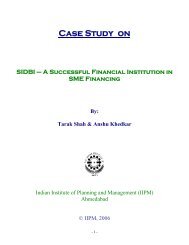
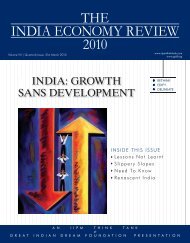
![[Feb 2008, Volume V Annual Issue] Pdf File size - The IIPM Think Tank](https://img.yumpu.com/43961117/1/190x245/feb-2008-volume-v-annual-issue-pdf-file-size-the-iipm-think-tank.jpg?quality=85)
![[June 2008, Volume V Quarterly Issue] Pdf File size - The IIPM Think ...](https://img.yumpu.com/41693247/1/190x245/june-2008-volume-v-quarterly-issue-pdf-file-size-the-iipm-think-.jpg?quality=85)
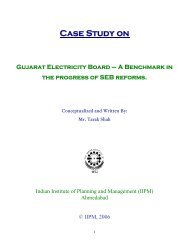
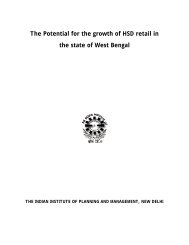
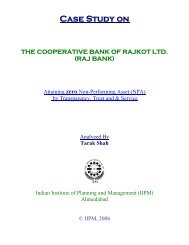

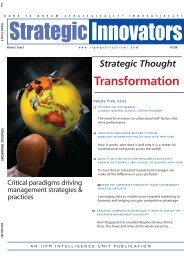
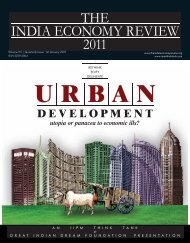
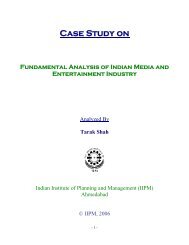
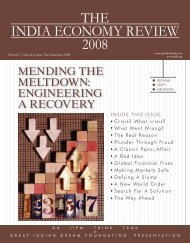
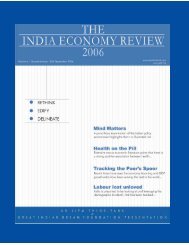
![[Volume VI | Quarterly Issue: 31st May 2009] Pdf File size](https://img.yumpu.com/27796051/1/190x245/volume-vi-quarterly-issue-31st-may-2009-pdf-file-size.jpg?quality=85)